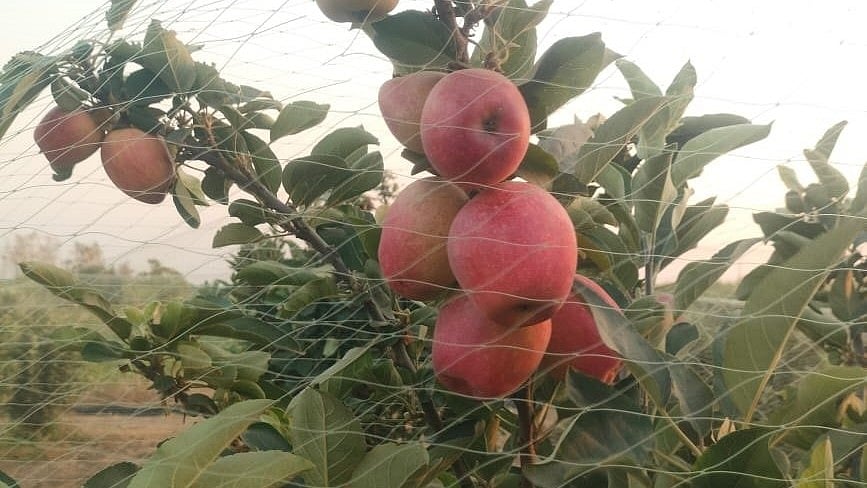
Credit: Special Arrangement
For the last one-and-a-half years, a seven-acre plot of land in Kulali village, Mudhol taluk, has become a picnic spot for many. This land belongs to Shrishail Teli, a farmer in Bagalkot whose work has drawn national praise and curious visitors alike. During November and December, hundreds of people flock to his field to see, in amazement, a fruit synonymous with snow-clad mountains. But here, the apple grows on plain, dry land.
The farm drew large numbers even before Prime Minister Narendra Modi praised the farmer, on the 121st episode of Mann Ki Baat. Since then, several politicians, religious leaders and farmers have been visiting his farm to see bunches of the fruit. A few of them return disappointed, as the season (March-April) is that of flowers, and not fruit.
For the last 12 years, Shrishail cultivated grapes in his field. While he earned an adequate income from it, he was not happy with the returns for the effort put in. Two years ago, he decided to take a risk and started cultivating apples in his field. He started with some research online. Following this, he consulted apple growers from other dry areas of the state (Chitradurga and Vijayapura) and Maharashtra. Then, he procured nearly 2,670 saplings of three varieties of apple (Anna, HRMN-99 and Dorsett Golden) from Shirdi and Pune.
“Many called me a fool for trying to grow a temperate fruit in a high-temperature area,” says Shrishail. He says 12 years of experience in the cultivation of grapes had taught him that with hard work and complete dedication, he could successfully nurture the apple saplings. “In the worst-case scenario, I could have sustained a Rs four-to-six-lakh loss for planting apple saplings. However, if I succeeded, I was sure of making good money,” he says. As they say, luck favours the brave; he ended up earning Rs 15 lakh from the first two yields.
He says he harvested at least 15-20 kg of fruit from every tree in the second season, and sold at least 20 tonnes of apples in the local market for Rs 85 to Rs 110 per kg. Another five tonnes of fruit were given to visitors who visited his field to taste. “I had also set aside two to three tonnes of fruits for birds and animals,” he says.
Shrishail says that apart from small quantities of chemical supplements, he relied on organic fertiliser and ‘jeevamrutha’, a liquid fertiliser made from cow dung and other ingredients.
To ensure he is not in complete loss during the two years the apple saplings take to start fruiting, he also planted other crops in the intermittent space and harvested 300 tonnes of watermelon and 150 tonnes of muskmelon and sweet corn each.
Arvind Balaganur, assistant horticulture officer, Mudhol, says Shrishail is a progressive farmer who has been experimenting in his fields for many years. “Cultivating apples in a climate which reaches 35-38 degrees Celsius during summer is not an easy task. Yet, with his determination and hard work, he has proved that nothing is impossible,” Arvind says. He adds that in the coming days, the farmer’s income could multiply, as the plants have grown completely and require minimum care.
Dareppa Tonne, a resident of Kulali village, says the apples grown by Shrishail were crispy and juicy. “Even without keeping them in the fridge, we were able to enjoy it for 15 days as it did not rot,” he says.
B Fakrudin, director of research, University of Horticultural Sciences, Bagalkot, commends the efforts of Shrishail. However, he is wary of other local farmers following suit, as the chances of success are low.
Almost a decade ago, the university experimented with cultivating apples in the region. However, there was limited success, forcing the university to drop its plans to take up cultivation of the fruit on a large scale.
“The university is in touch with Shrishail and is monitoring the progress of his efforts. We will study the entire process and draw our scientific conclusion if the cultivation of this fruit here can result in commercial success for farmers,” says Fakrudin.